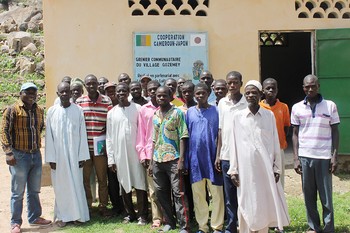Continuous snows, floods and the strongest hurricane ever recorded make up some of the biggest weather stories to come out of 2015. While U.S. communities still deal with the impact of this year’s unusual weather patterns, staff members of the Presbyterian Hunger Program and Environmental Ministries say poor countries are facing serious economic and health issues related to the weather.
Climate change impacts everyone, but poorer countries have fewer resources to help them adapt or quickly recover from severe flooding or drought.
“Our partners are experiencing severe and prolonged drought and heat, change of seasons, agricultural production and food security issues, water insecurity, health issues, migration, inflation on food imports,” says Valery Nodem, an associate with the Presbyterian Hunger Program. “I can name Niger, the Philippines and Cameroon as places where I recently have seen extreme droughts followed by extreme floods, food security issues and increased poverty.”
As the weather patterns have changed, Nodem says it has impacted entire agricultural seasons.
“No one knows the right time to plant anymore. For some countries, farmers knew it always rained around mid-January. When you have that first rain, you know it is time to go to the farm and get the ground ready for planting,” he says. “That’s not happening anymore. Mid-February comes and you are still waiting for rain. The seasons of drought are pro-longed and when you have the rain, it’s too much and damages everything.”
Nodem says communities in Niger are now digging deep wells (150-200 meters) in order to find water in order to grow the food they need.
“Niger is becoming a food import country because the people are unable to produce the food they need and it’s impacting the entire economy,” he says. “People have to eat so they are spending more money to buy food to survive.”
Rebecca Barnes, associate for Environmental Ministries, recently returned from Paris where she attended the COP21 United Nations Conference on Climate Change. While there is reason for concern, Barnes says people of faith should not look at it with “gloom and doom” or live daily lives paralyzed by fear and anxiety.
“We have faith in God and trust that God is working for the redemption of all creation. At the same time, yes, we should be concerned because faith in God doesn’t mean that human-caused climate change won’t require human intervention to alleviate its worst impacts,” she says. “As Christians, we need to be wise in 2016 and do what we can to create resilient communities and a healthier world and stand in justice-focused solidarity with people who are impacted the hardest.
That means, according to Barnes, working to reduce greenhouse gases, pressure government to champion global climate efforts, engage local communities to implement clean power plans and change lifestyles and perceptions of fair energy consumption.
In poorer countries like Niger, Nodem says they don’t have the same safety nets as the U.S. In times of natural disasters, there is no strong national response; people look to the U.S. and Europe for help.
“These governments don’t have the means to respond in a way that will help people get back on their feet,” he says. “People have to adapt to the change in their living conditions. If you have a flood, you find another place to move your family for safety. You find a close river or stream for drinking and hunt in the forest to find the food you need.”
The Presbyterian Hunger Program joins Presbyterians and partners around the world to raise their voices about climate change, and the causes and solutions that can help reduce greenhouse gases. Some of the projects supported by PHP are related to water access, organic food production and the retrieval of native seeds and foods.
In the U.S., the Presbyterian Hunger Program supports Presbyterian churches’ efforts to become more energy efficient through renewable energy and working for resiliency in impacted communities.
Barnes says, “Churches can reduce their own energy use, be good stewards of their own budget, add solar panels and support legislation that develops clean energy sources, and preach and teach on our call to care for God’s creation as a moral imperative.”
-----
For more information about the Presbyterian Hunger Program’s efforts regarding climate change and to learn more about becoming an Earth Care Congregation, click here. For more information on helping world communities in need, click here.

